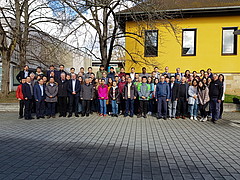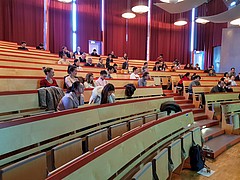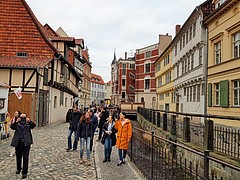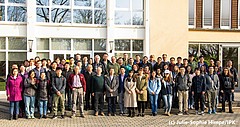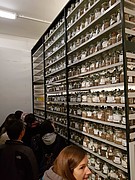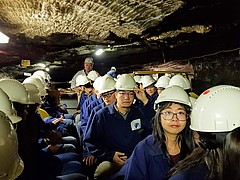Second Block Seminar [30.03.19]
The 2nd block seminar of the Sino-German IRTG “Adaptation of maize-based food-feed-energy systems to limited phosphate resources – AMAIZE-P", with the overall topic “The genetic potential of phosphate efficiency”, was held in Hohenheim from March 18-23, 2019, including an excursion to northern Germany.
About 90 participants, 45 from Germany and 45 from China, took part in the 2nd block seminar. Three international invited speakers from research institutions in Japan, Brazil and France, one invited speaker from a research institution in Germany, plus two speakers from the University of Hohenheim gave scientific lectures for the German and Chinese doctoral candidates on March 18, 2019.
The presentations by the German and Chinese doctoral candidates and the post-doctoral researcher of the IRTG’s 13 Research Subjects were held on March 19, 2019 at the University of Hohenheim
A meeting of all Chinese and German principle investigators and senior scientists and two advisory board members of the AMAIZE-P IRTG took place in the afternoon of March 18, 2019.
Site visits and excursion
As central part of the 2nd block seminar, a three-day excursion to northern Germany was organized by the scientists of the second research subject (RS) 1 from March 20 - 22, 2019. A total of 60 persons took part in the excursion. Departing from Hohenheim on March 20 in the morning by bus, the ancient town of Quedlinburg (UNESCO World Heritage site) in Saxony-Anhalt was reached in the afternoon, with subsequent visit of the medieval town with a history of over 1000 years.
On March 21, 2019, the Leibniz Institute of Plant Genetics and Crop Plant Research (IPK) in Gatersleben, Saxony-Anhalt, was visited. The IPK is a nonprofit research institution and a member of the German Leibniz Association. It is specialized in ‘conserving, exploring, and exploiting crop diversity’ and accommodates one of the world’s largest ex-situ gene banks. Following a general introduction to the institute and a scientific lecture, three sub-groups were guided in turns through the famous gene bank, the phenotyping chambers and the plant cultivation hall for plant phenotyping, respectively, as well as field experiments. There were many opportunities for the doctoral researchersto ask specific questions as part of their case studies carried out in the Educational Programme (see below).
In the afternoon of March 21, the KWS SAAT SE (Kleinwanzlebener Saatzucht) company was visited in Einbeck, Lower Saxony. KWS is a family-owned seed and biotechnology company and is nowadays the 4th biggest seed producer worldwide, breeding sugar beet, corn, cereals, oilseed rape, etc. Two talks were given by the responsible maize breeders of KWS, and there was sufficient time available for the doctoral researchers to ask questions as part of their case studies (see below).
On March 22, 2019, the “Merkers Adventure Mine” (Erlebnis Bergwerk Merkers) near Bad Hersfeld, belonging to the K+S Kali GmbH potash mine, was visited. This very special tour, on roads 600 m below ground, included a mining museum, geological information as well as information on the mine’s history. The bus returned to Hohenheim in the afternoon of March 22.
Educational programme
As part of the educational programme, an educational talk on “Internal P utilization efficiency: How to address this trait in crop breeding?” was given in the afternoon of March 18, 2020 by Dr. Matthias Wissuwa, senior researcher at the Japan International Research Center for Agricultural Sciences (JIRCAS), Tsukuba, Japan.
In connection with the three-day excursion, case studies were implemented as one part of the qualification programme for doctoral candidates of this IRTG. Each tandem or group of doctoral candidates of every RS were asked to identify three questions beforehand which they would pose to scientists or staff during the visits to the institutions of the excursion according to their own choice. The aim was to encourage the doctoral researchers to prepare themselves thoroughly for the visits and obtain the greatest benefit possible from the high-level expertise available there. As output of the case studies, each tandem or group of doctoral researchers delivered a 1-3-page summary detailing the answers to their previously formulated questions.
A one-day Intercultural training workshop for the German and Chinese doctoral researchers was organized in collaboration with the CHIKOH project at the University of Hohenheim on March 23, 2019 with two invited trainers. For details in German also see separate news item.

